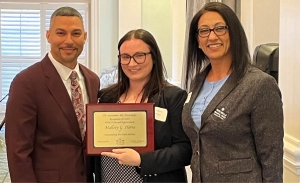
Camille Stell
is President and CEO of Lawyers Mutual Consulting & Services. Continue this conversation by contacting Camille at camille@lawyersmutualnc.com
Employee engagement is more than just a buzzword; it is a fundamental factor that can make or break the success of your law firm. With a New Year comes a new opportunity to develop strategies for a more engaged legal team.
What is employee engagement?
In today’s competitive battle to hire and retain legal talent, law firms are recognizing the importance of actively involving and motivating all of their employees, from part-time to full-time to associates. Employee engagement goes beyond satisfaction – it’s about creating an environment where employees are emotionally invested in their work, committed to your firm’s goals, and motivated to contribute their best. Employee engagement is the overall sense of being energized and passionate about one’s work and dedicated to one’s workplace.
Why is employee engagement important?
Engaged employees lead to increased productivity, improved morale, and provide better client service. However, according to Gallup’s State of the Global Workplace report, only 15% of employees are engaged with their work.
There are many factors that contribute to disengagement including economic uncertainty, the recent pandemic, pay inequity, mental health issues, and work / life balance among other factors have contributed to downward shifts in employee engagement.
Gallup further estimates that the total cost of disengaged employees in the U.S. is a staggering $450-500 billion each year. A typical statistic quoted by HR organizations is that average turnover costs are 33% of annual salary. Engaged employees are less likely to seek opportunities elsewhere, reducing recruitment and training costs.
Engaged employees are more likely to be focused and committed to their work. The pride they experience results in higher levels of productivity and efficiency. When employees feel valued and appreciated, job satisfaction naturally follows. Engaged workers find meaning and purpose in their roles, leading to a more fulfilling work experience.
Workplace culture is a large determinant in maintaining engaged employees. Engaged employees are more likely to contribute ideas and suggestions, making innovation and collaboration elements of a positive work culture. This positive work culture also attracts top talent and creates a cycle of success in recruiting and retention of employees.
Strategies for Fostering Employee Engagement
Transparent communication is the foundation of employee engagement. Organizations should strive to maintain clear channels of communication, making sure that information flows freely in all directions. Regular updates on goals, performance, and strategy create a sense of belonging and purpose among your team. Monday morning meetings to compare schedules and docket, upcoming projects, and client meetings help everyone do their part in moving the firm forward for the week ahead.
Involving all team members in decision making in appropriate circumstances fosters a sense of ownership and responsibility. When employees feel that their opinions matter and have an impact on the law firm, they are more likely to be engaged. Early in my career, a senior member of the law firm would consistently ask my advice as we prepared for trial. He knew my hands had been in the documents and how they were organized, I had summarized the medical records and deposition testimony and he was interested in hearing my thoughts on how that information was presented to the jury through exhibits and trial notebooks. I never forgot his manners and kindness – he was a true gentleman – but he also shaped my ideas moving forward of how lawyers and paralegals should collaborate on a trial team.
A healthy team results in a more engaged team. Wellness programs that focus on both physical and mental well-being have a positive impact on employee engagement. Your wellness program can include insurance and adequate time-off policies, as well as gym memberships, mental health resources, or initiatives promoting a healthy work-life balance. Employees feel valued when they see you prioritizing their well-being.
Providing opportunities to participate in professional development opportunities such as CLE, training programs, and mentoring opportunities demonstrates a commitment to employees’ long-term development. When your team sees a clear path forward for growth, whether it’s a Path to Partnership or a path to continued learning and growth in their career, they are more likely to remain motivated.
Recognition and appreciation programs help employees feel valuable. Acknowledging your teams’ contribution can include employee of the month award, a shout-out in a team meeting, or even a personalized note of appreciation. The Lawyers Mutual president, Dan Zureich, makes it a habit to drop by an employee’s office with a gift card to show appreciation for completion of a special project or company initiative. These simple efforts contribute to a positive work culture, and they boost morale.
The modern workforce values flexibility. Offering flexible work arrangements such as remote work options or flexible schedules can significantly contribute to employee engagement. Flexibility allows your team to achieve a better work-life balance leading to increased job satisfaction and commitment to their roles at the firm.
Employees crave feedback on their performance. Your team members want to have a conversation with you about the value they bring and not just once a year at performance review time. Offering ongoing, on-the-spot dialogue is good, scheduling quarterly one-on-one meetings to discuss performance, constructive feedback, celebrating successes, goal setting, and employee feedback on what is happening inside the firm through their eyes is even more important. These meetings can also be viewed as “stay interviews” providing you with opportunity to understand firm retention, what causes your team members to stay at the firm, and whether the firm is living up to the promises they made.
Fostering an engaged workforce requires a holistic approach that addresses all aspects of the employee experience. Experiment with implementing some of these strategies or creating your own in 2024.
Camille Stell is the President of Lawyers Mutual Consulting & Services and the co-author of the book, RESPECT – An Insight to Attorney Compensation Plans available from Amazon. Continue this conversation by contacting Camille at camille@lawyersmutualconsulting.com or 800.662.8843.















